When the restrictions of movement and the temporary closure of universities were announced in Hungary, both Roma Collegia of the Reformed Church in Hungary suspended their operation – at least within the walls of the institutions. Although the students had to go home both from Budapest and Debrecen, the activities are still just as intensive as before: taking full advantage of online opportunities, the institutions are still providing professional programmes, language classes and Bible study sessions.
If we asked anyone who has ever had anything to do with a Roma Collegium what three things they would associate with the institution, they would almost certainly mention community. Well, it was exactly this aspect that vanished instantly on 16 March, when the government of Hungary ordered schools and universities to close, which also endangered the regular and scheduled activities of their associated institutions.
The two Roma Collegia – the Reformed Roma Collegium in Budapest (RefoRom) and Debrecen-based Wáli István Reformed Roma Collegium (WISZ) – had to react instantly, as both institutions offer a lot more than mere “services”: most students come from families with multiple disadvantages, therefore the scholarship and accommodation, as well as other advantages offered to members of a Roma Collegium are not only important because they aid students in attaining a university degree, but also because they ease families’ financial burdens.
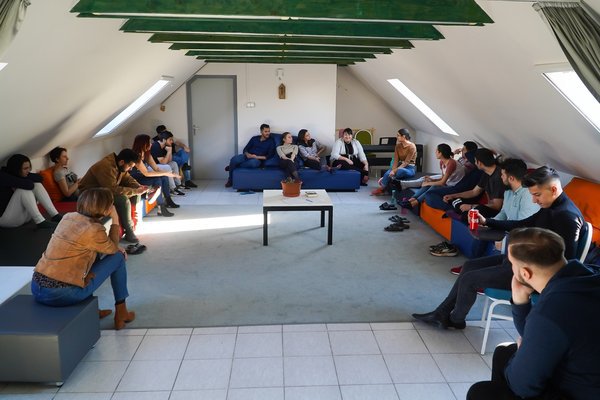
The Christian Roma Collegium/Special College Network is a program that the Hungarian Government launched in 2011 in strategic cooperation with the Churches. RCH has two Reformed Colleges respectively in Debrecen and Budapest. Colleges provide support to Roma students in the form of financial aid, housing assistance, additional coursework and mentoring. Aside from academic opportunities, the students are encouraged to explore Roma spirituality and culture as well. Scholarships, social activities, as well as volunteering opportunities and community service are provided by the program. The special colleges aim to explore values of the Christian life as well as Roma culture and identity and encourages the Roma students to find their value and place in the world. Mentors monitor both academic and spiritual development. Ultimately, the Collegium hopes to send out well and holistically educated individuals into Hungarian society. The Collegium's programs are open for non-Roma students, but the institution offers accommodation and financial support to Roma candidates exclusively, as a very low percentage of Romas have the opportunity to study at universities or colleges.
Our dormitory is like a big, noisy family, so at first I felt like Kevin in Home Alone when he is first left in a big house all by himself.
‘Those who had no parents to go home to, or who would have had to find a safe way to reach their home abroad, were allowed to stay in the dormitory on condition that they comply with the restrictions on movement,’ said Kálmán Káli-Horváth, Head of the Budapest Reformed Roma Collegium, and similar concessions were made in the Debrecen institution as well.
‘Coming from outside Hungary, I acutely felt being far from my family and moving out from the dormitory would have been very difficult,’ said Tamara Pető. ‘Our dormitory is like a big, noisy family, so at first I felt like Kevin in Home Alone when he is first left in a big house all by himself. For a short while everything seems great, and then suddenly you start missing the regular things. It was strange to have breakfast in the quiet kitchen, and after a while I realized that the sound of laughter coming from the club room would not bother me at all while I’m studying, and I wouldn’t mind waiting for the washing machine while someone else is doing laundry,’ added Tamara, who studies dietetics at the University of Debrecen.
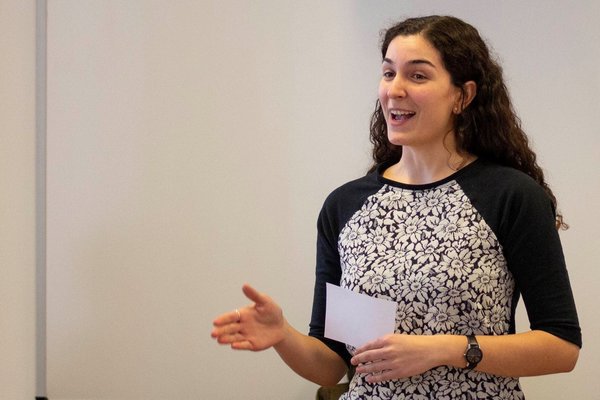
Tamara Pető
It is strange that I can’t even say a proper goodbye to my friends there
Dávid Szilágyi, who studies to become a legal assistant, sympathizes with Tamara’s feelings. ‘Although we spend time together in the virtual sphere during Bible studies and general assemblies, I still miss my peers,’ he explained, and his opinion is shared by Regina Szidónia Oláh, who is in her final year in a human resources assistant MSc course. ‘I find it harder and harder to deal with the current situation, especially because this is the last semester that I could have spent in the Collegium. It is strange that I can’t even say a proper goodbye to my friends there,’ she said sadly. ‘The Collegium has done very well in maintaining online contact and handling assignments, in contrast to my university classes which became utterly chaotic: each instructor started using a different platform and I could hardly keep up with what to send to whom and where,’ she added.
Members of both Roma Collegia have to fulfil significant professional requirements each semester, by participating in joint programmes and workshops. Having lost the physical proximity of their students, the institutions were forced to modify the original requirements. ‘We use Microsoft Teams, where we developed an adapted version of the professional programme, which can be completed via online communication,’ explained Áron Mózes, Head of Wáli István Reformed Roma Collegium. ‘This way, not only are we able to provide education and support, but there are also opportunities to experience community. We use IT platforms to carry out mentoring, course-related support and pastoral care.’
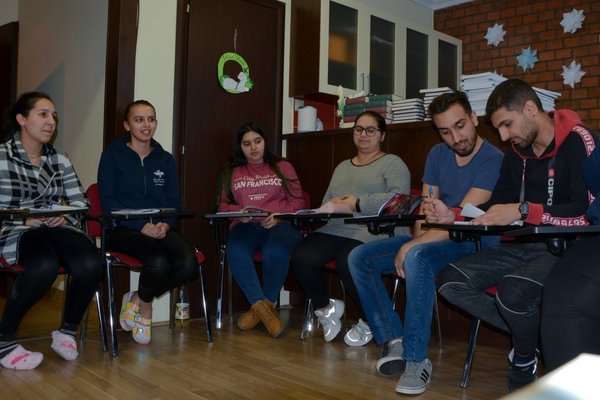
A significant element of community building is the opportunity to take part in online Bible study twice a week, which is still popular
‘We tried to set up professional expectations in a way that our students are able to meet the scholarship requirements,’ Kálmán Káli-Horváth went on to explain, adding that the current state of emergency has some positive implications for the future. ‘The switch to digital education has involved methodological developments as well. To a certain extent, we would like to continue using the system of handing in assignments online during exam periods in the future,’ he said.
The method successfully used by WISZ can be implemented in several areas: ‘A significant element of community building is the opportunity to take part in online Bible study twice a week, which is still popular. Similarly, we organize our general assembly meetings and the Collegium’s council meetings in an online setting, and employees also keep in touch this way (e.g., through online employee meetings),’ explained Áron Mózes, but he also pointed out the downside of the current situation. ‘We pray for those who are not in a position to enjoy the benefits of online contact the way we do. We had students at WISZ who needed our support in acquiring the technical requirements needed in this new situation.’
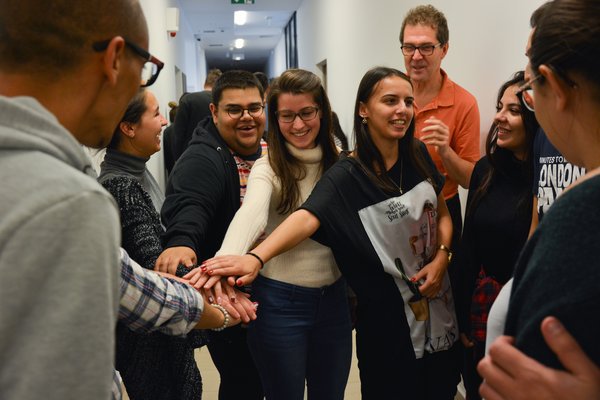
The Roma Collegium in Budapest has launched a new programme called ‘Stay at Home Internship’ with the aim of supporting their members
‘The switch came about very suddenly, and I don’t think anyone expected at first that the state of emergency would drag on for so long,’ said Krisztina Papp, who works at RefoRom in a professional and administrative capacity. ‘The changes were dramatic, indeed: moving out of the dormitory, some losing their income sources, worrying about all kinds of things, practising social distancing. Initially there was a complete sense of uncertainty regarding how college/university education would continue, and then the assignments started coming in all at once, making it difficult to prioritize them. So this is the setting in which the Collegium has been trying to continue operating, helping students in any way it can.’
Reacting to this new situation, the Reformed Roma Collegium in Budapest has launched a new programme called ‘Stay at Home Internship’ with the aim of supporting their members. ‘One of the programme’s goals is to provide social support to students and their loved ones, to contribute to the living expenses of the family and the self-sustenance of the students, who now had to return to families that often suffer from economic hardships,’ Kálmán Káli-Horváth mentioned. In the programme, the Collegium members create written and audiovisual content and report on their professional development, and thus are able to contribute to the family budget by earning scholarship funds instead of looking for employment.
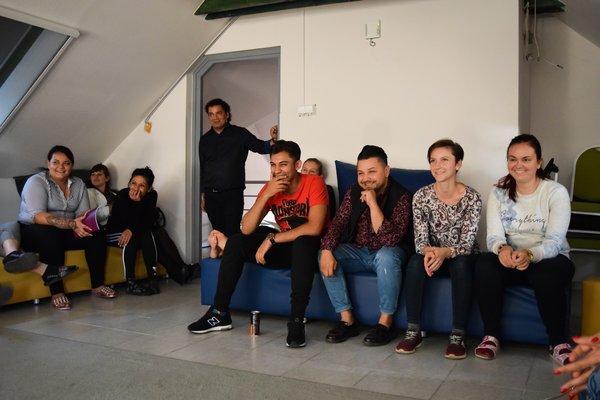
We only have Wi-Fi in one room at home
Sára Pém, who comes from Borsod county and is an international studies major at Corvinus University in Budapest, had to move back home to Miskolc. Although she has gotten used to being at home, she is somewhat irritated by how small her living space has become. ‘We only have Wi-Fi in one room at home, so all of us spend the whole day there, often commenting on each other’s classes, which can lead to tensions. At the same time I’m very grateful to RefoRom for the support they have been providing. It means I can lend money to family members, and occasionally buy pizza for the whole family.’
Not everyone has been so lucky to be able to go home or stay in the dormitory of the Collegium during the first weeks of the pandemic lockdown. Brigitta Orsos started the semester in Perugia, in central Italy, which was the European epicentre of the coronavirus pandemic for a long time, and she still has not returned home. ‘We only attended classes in person for three days, and have been taking part in distance learning ever since,’ she explained.
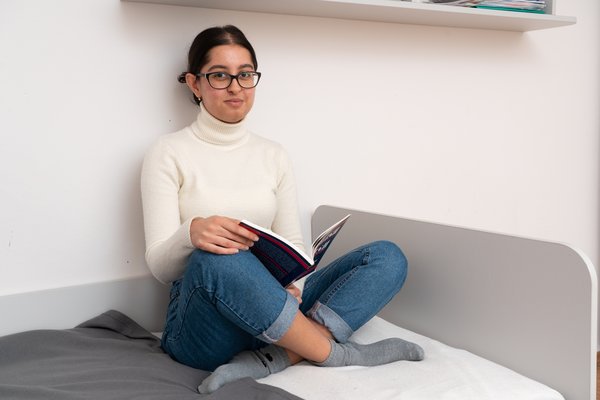
Brigitta Orsos
In times of being confined to your home, you can easily get overwhelmed by feelings of despair, worry and loneliness.
‘We are only allowed to go to the supermarket and the pharmacy, and I must admit that such confinement is not easy to deal with. I’m also sad because I probably won’t be able to visit the places in Italy that I planned to see. On the other hand, it is reassuring that back home my family is fine and everyone is healthy. Being an Erasmus student at present, I’m exempt from completing Collegium membership requirements, but I still attend the online Bible study sessions on Mondays whenever I can. It is great to see some familiar faces and hear how the others are dealing with the current situation,’ said Brigitta, who studies interpreting and translation at Pázmány Péter Catholic University.
Bible study sessions are organized by the institutions’ resident pastors – once a week at RefoRom, and twice a week at WISZ – and these meetings are even more powerful in the current situation. ‘We see each other in Bible study every Monday and Wednesday, and together we lean towards the Word of God and we experience our community in spirit,’ explained Márton Lovász, the spiritual leader of the Debrecen Roma Collegium. ‘These sessions have a preserving and reinforcing power, as in times of being confined to your home, you can easily get overwhelmed by feelings of despair, worry and loneliness.’
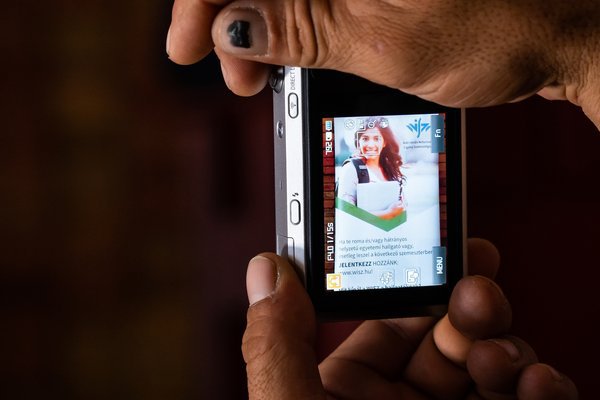
Experiencing that we are not alone is truly uplifting, as God is still present in our lives, and our “neighbours” are not so far away either. Perhaps in a different form than a few weeks ago, but a sense of community still exists among us.
Márton described the Bible study sessions of WISZ the following way: ‘Experiencing that we are not alone is truly uplifting, as God is still present in our lives, and our “neighbours” are not so far away either. Perhaps in a different form than a few weeks ago, but a sense of community still exists among us. We feel this at the beginning of each meeting when we all express our gratitude, and at the end, when we pray together – some of us pray silently, while others say a prayer aloud, carrying each other’s burdens.’
An important aspect of professional development is the free language teaching offered by the Collegium – led in Budapest by Marianna Sebestyén, a language teacher, who feels that the transition to online teaching was smooth. ‘Since the lockdown, we have been preparing students for language exams and the advanced-level school-leaving examination via video calls, and we can still send them listening and grammar materials and exam-type exercises, as well as receive students’ homework assignments.’
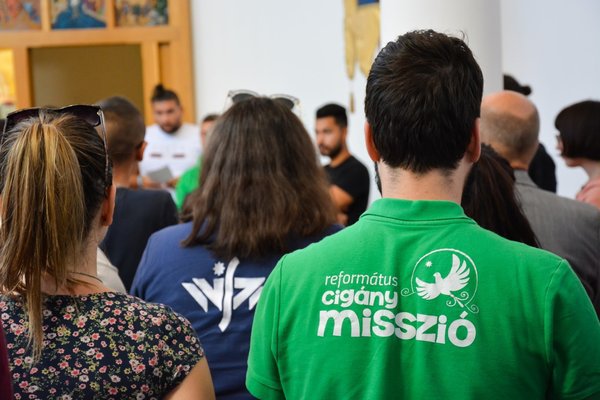
Speaking of language exams, we asked Ms. Sebestyén about the government’s decision announced on 10 April that university students no longer need to pass a language exam to receive their degrees. ‘We discussed this issue with my colleagues, and we all feel that this temporary measure could become a point of contention. Once the state of emergency is over, the plan is to reinstate the requirement of a language exam for university degrees. And regardless of that, Hungary is still a member of the European Union, and our students have long-term plans that include going, studying or working abroad, in which case knowing a language is indispensable,’ summed up the teacher.
It is clear from the previous paragraphs that the two Collegia have found different ways to cope with the new situation, but their goal has remained unchanged: to help disadvantaged, mostly Roma students in any way they can. They are motivated to do so by the command of the Gospel anyway, but in the “postcoronial” world it is going to be even more important to have such youth be well-qualified when they enter the labour market.
Originally published on the website of the National Roma Ministry of RCH. Translated by Erzsébet Bölcskei